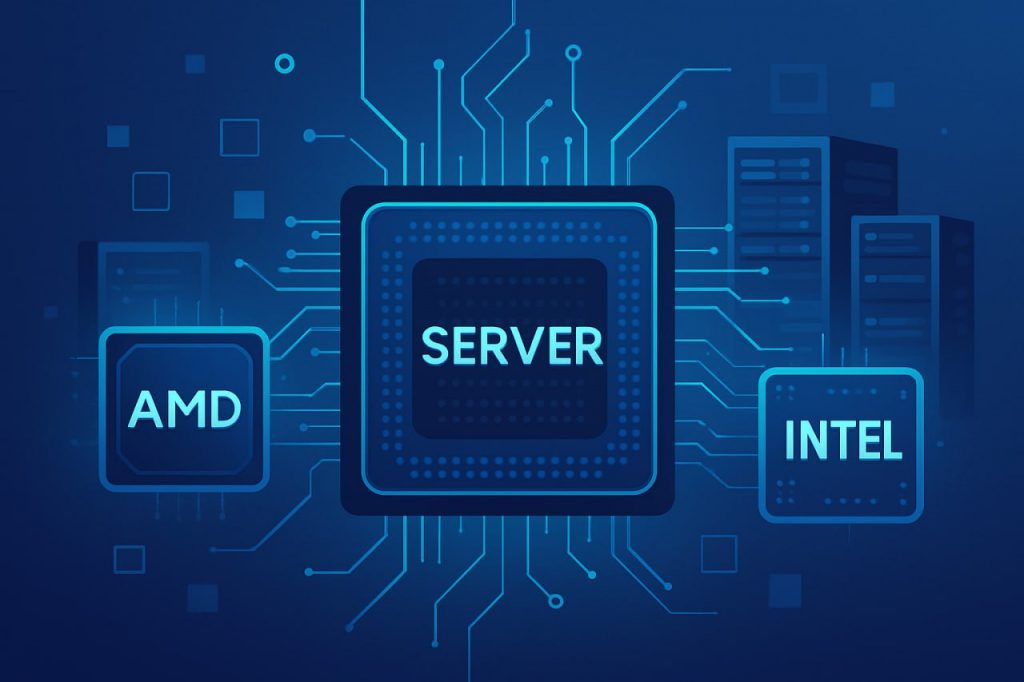
The server is the heart of any IT infrastructure. Its performance affects the speed of request processing, stability of websites, databases, email services, and many other systems. The central component of the server is the processor. It performs all calculations, distributes resources, and ensures interaction between software and hardware. But which processor to choose — AMD or Intel? In this article, we’ll review the key differences between these two manufacturers and offer practical advice on selecting the best solution for your needs.
Why is the processor choice so important?
The processor determines not only server speed but also:
– how many virtual machines can be run;
– how efficiently databases will work;
– how quickly web requests will be processed;
– whether there will be enough power for backup, encryption, logging, etc.
Therefore, CPU selection should depend on the type of server workload — whether it’s web hosting, streaming, gaming, large databases, or complex calculations.
AMD or Intel: Brief Overview
Intel is a company with extensive experience in server solutions, known for stability, broad compatibility, ECC memory support, energy efficiency, and optimization for corporate tasks. The Xeon lineup is a flagship for server computing.
AMD has made a breakthrough in recent years with its EPYC line. These processors offer excellent price-to-performance ratio, a high number of cores and threads, and high bandwidth due to a large number of PCIe lanes.
Processor Comparison: AMD EPYC vs Intel Xeon
| Feature | AMD EPYC | Intel Xeon |
| Cores/Threads | up to 96 cores, 192 threads | up to 60 cores, 120 threads |
| Clock Speed | 2.0–3.7 GHz | 2.0–3.9 GHz |
| Architecture | Zen 3 / Zen 4 | Ice Lake / Sapphire Rapids |
| PCIe Support | PCIe 4.0 / 5.0 | PCIe 4.0 / 5.0 |
| Power Consumption (TDP) | 120–280W | 125–270W |
| Price | Often lower with better specs | Usually higher |
| Memory Support | DDR4 / DDR5 | DDR4 / DDR5 |
| Memory Channels | up to 12 channels | up to 8 channels |
Summary:
– AMD EPYC wins in multi-threading, energy efficiency, and cost per core;
– Intel Xeon is preferred for stability, compatibility, and enterprise integration.
When to Choose AMD
– Virtualization and Cloud Services. More cores = more virtual machines. AMD offers up to 96 cores for highly scalable environments.
– Big Data Processing. Log analysis, analytics, complex calculations — all benefit from AMD’s parallelism.
– High-traffic Web Applications. AMD’s threading handles many simultaneous user requests efficiently.
– Value for Money. EPYC often delivers better performance at a lower price, ideal for startups and SMBs.
When to Choose Intel
– Enterprise Solutions. If your infrastructure is already built on Intel, it’s easier to expand.
– Mission-critical Systems. Intel is trusted for stability in systems where downtime is not an option.
– ERP/Accounting Software. Some platforms are optimized for Intel instructions.
– Single-threaded Performance. Intel still holds an edge in performance per core in some cases.
What to Consider When Choosing a CPU
- Cores and Threads. More cores improve multi-tasking.
- Clock Speed. Important for high-speed, low-latency tasks.
- TDP. Affects power supply and cooling requirements.
- RAM Compatibility. Look for ECC support, DDR4/DDR5.
- Cost Efficiency. Measure performance per dollar, not just specs.
Practical Tips
– Define the workload: is it CPU-intensive or I/O-bound?
– Check official AMD and Intel documentation for details.
– Consider future scalability.
– Choose a hosting provider offering modern, flexible servers.
Where to Order a Server with the Right Processor
When choosing a server, it’s not only about the right CPU but also reliable support, fast connectivity, and configuration flexibility. We recommend dedicated servers from Server.ua, where you’ll find powerful Intel and AMD options tailored to your needs. RX-NAME provides professional hosting, high reliability, and expert support.
Conclusion
The choice between AMD and Intel depends on your project’s needs. For high parallel performance, choose AMD. For trusted stability and compatibility, go with Intel. Most importantly, your server should match your actual workload. Contact RX-NAME for help selecting the right configuration. Order your powerful server today — server.ua

Leave a Reply